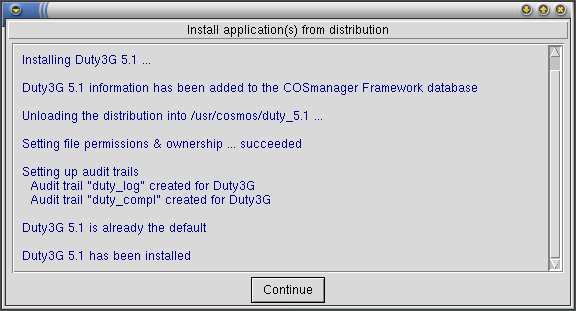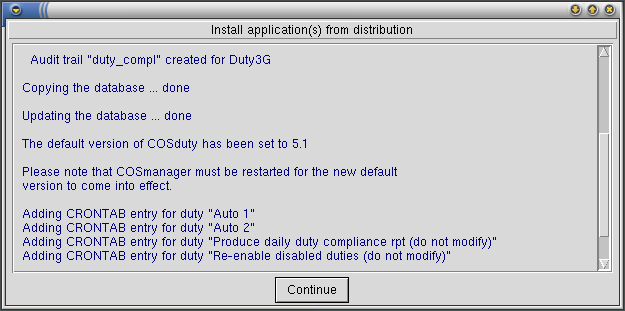Duty3G/User Guide/Appendix A — Installing duty3G
From Documentation
(Difference between revisions)
| Revision as of 06:25, 14 September 2006 Moff (Talk | contribs) (→Upgrading duty3G) ← Previous diff |
Revision as of 06:37, 14 September 2006 Moff (Talk | contribs) (→Upgrading duty3G) Next diff → |
||
| Line 31: | Line 31: | ||
| #From the Product configuration menu, select COSmanager configuration > COSmanager applications. | #From the Product configuration menu, select COSmanager configuration > COSmanager applications. | ||
| #Select Application > Install. | #Select Application > Install. | ||
| - | #Press "choose". You will see a list of the applications that can be installed. Choose the entry titled duty3G latest version, and press Accept. | + | #Press Choose. You will see a list of the applications that can be installed. Choose the entry titled duty3G, and press Accept. |
| - | #:COSmanager copies the duty3G files from the distribution file to the target directory, updates the duty3G audit trail and creates the duty3g compliance report directory. | + | #COSmanager copies the duty3G files from the distribution file to the target directory, updates the duty3G audit trail and creates the duty3g compliance report directory. |
| - | # | + | #To migrate your existing COSduty 3.0 database to the newly installed version press Copy. Your existing database is copied and updated with new table columns. |
| + | #To make the newly install Duty3G the default version press Accept, then press Continue. | ||
| - | :This completes the installation. | + | :Any automatic duties will be added or re-added to the ''cosmos'' crontab. |
| + | |||
| + | :This completes the upgrade installation. You must restart COSmanager for the new version of Duty3G to come into affect. | ||
| <br> | <br> | ||
Revision as of 06:37, 14 September 2006
This chapter describes how to install duty3G for your environment. duty3G is installed through the COSmanager configuration menu. See Installing Applications and Modules in the COSmanager User Guide for full details of how to install COSmanager applications.
What you need
- the COSmanager framework installed on the target platform
- a duty3G Distribution
- a valid license key
- you must be a COSmanager user with the Manager role
Installing duty3G
- Download the distribution file to /tmp on the target host.
- From the Product configuration menu, select COSmanager configuration > COSmanager applications.
- Select Application > Install.
- Press "choose". You will see a list of the applications that can be installed. Choose the entry titled duty3G latest version, and press Accept.
- COSmanager copies the duty3G files from the distribution file to the target directory and creates the duty3G audit trail and the duty3g compliance report directory.
- This completes the installation.
Upgrading duty3G
- Download the distribution file to /tmp on the target host.
- From the Product configuration menu, select COSmanager configuration > COSmanager applications.
- Select Application > Install.
- Press Choose. You will see a list of the applications that can be installed. Choose the entry titled duty3G, and press Accept.
- COSmanager copies the duty3G files from the distribution file to the target directory, updates the duty3G audit trail and creates the duty3g compliance report directory.
- To migrate your existing COSduty 3.0 database to the newly installed version press Copy. Your existing database is copied and updated with new table columns.
- To make the newly install Duty3G the default version press Accept, then press Continue.
- Any automatic duties will be added or re-added to the cosmos crontab.
- This completes the upgrade installation. You must restart COSmanager for the new version of Duty3G to come into affect.
Configuring duty3G
duty3G comes with predefined duties for other COSmanager products. The next task is to customize duty3G, by adding new duties to automate other tasks frequently performed at your site. You do this through the duty3G configuration console.
Press Config from the COSmanager button bar.
Figure 13 — duty3G configuration console
The main steps to set up an initial configuration are:
- add new duties
- See To Define a Duty
- assign existing duties to the correct roles



